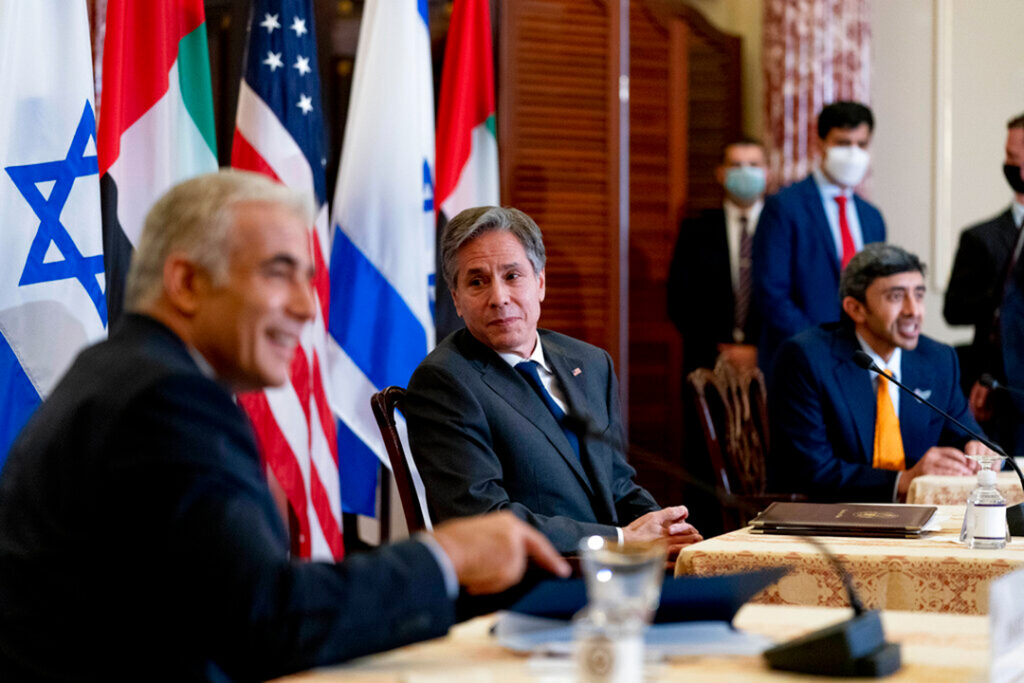THE ASSOCIATED PRESS
The United States and its closest partners are stepping up pressure on Iran to return to stalled nuclear negotiations, warning that it will face greater international isolation, new economic penalties and possibly military action if it forges ahead with its atomic program.
In a series of high-level diplomatic meetings in Washington, U.S., European, Israeli and Arab officials agreed on the need to make clear to Iran that its continued resistance to rejoining the talks in Vienna will not be ignored or left unpunished.
The consensus comes amid growing concerns that Tehran is not serious about returning to negotiations aimed at bringing Iran and the United States back into compliance with the languishing landmark 2015 nuclear deal that former President Donald Trump withdrew from three years later.
It also comes as the President Joe Biden’s administration, which had made rejoining the accord a priority, and others become increasingly pessimistic about the prospects for such negotiations even if they resume.
Iran was at the top of the agenda in all the meetings that brought together top diplomats from the European Union, Israel, Saudi Arabia and the United Arab Emirates, according to officials who participated, including U.S. Secretary of State Antony Blinken, EU foreign policy chief Josep Borrell, Israeli Foreign Minister Yair Lapid, Saudi Foreign Minister Prince Faisal bin Farhan Al Saud and Emirati Foreign Minister Abdullah bin Zayed Al Nahyan.
The U.S. special envoy for Iran, Robert Malley, continued the Iran conversation with Gulf Arab states, while the head of the United Nations’ atomic watchdog, Rafael Grossi, visited Washington for further discussions. (Pictured: U.S. Secretary of State Antony Blinken, accompanied by Israeli Foreign Minister Yair Lapid, left, and Emirati Foreign Minister Abdullah bin Zayed Al Nahyan, right, appears at a joint news conference at the U.S. State Department.)
Iran has hinted it’s ready to return to indirect negotiations with the U.S. but has not yet committed to a date. The EU, which has been charged with organizing the talks, has reported that Iran may not be willing to do so anytime soon and wants to meet with Borrell and others in Brussels before returning to Vienna.
As the new Iranian government led by hard-line President Ebrahim Raisi delays, it has continued to blow through limits on its nuclear activities that had been constrained by the deal, including enriching uranium to higher levels. This has alarmed U.S. officials who fear that if such activity continues, a return to the 2015 deal may be pointless.
Borrell, whose top aide just returned from Tehran to gauge the position of the government, said he is willing to meet with Iranians ahead of a resumption in the Vienna talks. But he said enough time had already passed for Raisi and his team, which took office in August, to prepare.
“I’m ready to do that if they want to come to Brussels, but time is pressing,” Borrell told reporters. “I understand that the new government requires time to study the file, to instruct the negotiation team, but this time has already passed. It’s time to go back to the negotiations.”
Asked about the possibility of a failure in negotiations and what might follow — something often referred to as Plan B — Borrell replied: “I don’t want to think about Plan Bs. No Plan B that I could imagine would be a good one.”
“We’re in a very dangerous place,” Prince Faisal, the Saudi foreign minister, told reporters, noting Iran’s accelerating nuclear work. “I think we need to focus on a quick resumption of talks [and] suspension of these activities by Iran.”
IMAGE CREDIT: THE ASSOCIATED PRESS

